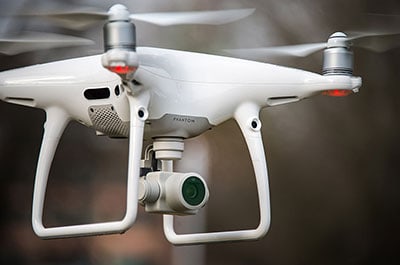
The City Council Meeting of June 10, 2019 was a milestone for the Unmanned Aerial Vehicle pilot program being conducted by the Culver City Police Department, and an important watermark for the concerned citizens arguing against the use of drones. After long and thorough discussion by 17 speakers and all five city council members commenting on the report by Police Capt. Jason Sims, it was decided that a citizens advisory committee would be investigated under the auspices of the city’s nascent human rights commission. The next checkpoint for the drone program would be on the agenda before the end of the year, in November or December.
With a long and detailed agenda, people who had come to speak on the drone program waited several hours through the consent calendar and public hearings. Mayor Meghan Sahli-Wells ran the meeting with such brisk efficiency that several minor delays were attributable only to technical issues on collecting the votes from the council members.
Sims presentation on the very beginnings of the drone pilot program, which began in March, offered some changes in the language defining the police use of the machines, emphasizing that there were no weapons of any kind on the drones, and that the footage was not to be used to humiliate anyone.
Comparing with other nearby police departments and the Los Angeles County Sheriff, the push for a Citizen’s Oversight Committee found a few correlations. The Redondo Beach Police Department has a Community Engagement Board, Beverly Hills Police Department has a Chiefs Advisory Board, the LASD has a Civilian Advisory Board, and the Los Angeles Police Department has a Police Commission, each tasked with some form of keeping the police in accountable communication with citizens.
Speakers were emphatic on all sides of the issue, and there was a push from many to have the approval of the drones re-agendized, with several offering thoughts that it had not been properly presented on the original approval.
Monica Harmon offered the example of school shootings, and the recent hostage situation at Rodeway Inn as why the drones were tools needed by the police.
Gerald Wiener of the Culver City Action Network noted that the recent changes to the policy language were enough to make him feel that the pilot program could proceed, but that CCAN was not in favor of drones.
Rebecca Rona-Tuttle called for the approval of drones to be re-agendized.
Khin Khin Gyi offered specific examples of how drones had been used in other situations by police departments to violate people’s civil rights.
Neil Glickman voiced concern that an oversight committee would be a political tool.
The council listened, and as each of them began to speak to the issue, they all used a variation of the same statement; “This is a really tough decision.”
Council member Alex Fisch and Vice Mayor Goran Eriksson both made statements that the pilot program needed to be carried through. Both council members Thomas Small and Daniel Lee offered that they would be willing to re-agendize, but neither of them were interested in making the motion.
Mayor Sahli-Wells stood firm in her concluding argument, saying “I am not in favor of re-agendizing this issue. We are in the middle of a program to collect data, to study the use of the drones, and once we have that information, that will be the time to consider policy.”
Council member Lee suggested that putting the citizens committee under the umbrella of the human rights commission would allow for some research into how such a mechanism might work.
The matter was concluded with the drone pilot program authorized to continue, and expected to return to the council later this year at the halfway point ( 9 months of the 18 month study), and a citizens advisory committee to be considered.
Judith Martin-Straw


Thank you for this summary.